Yaqi Zhao
Baichuan-Omni-1.5 Technical Report
Jan 26, 2025
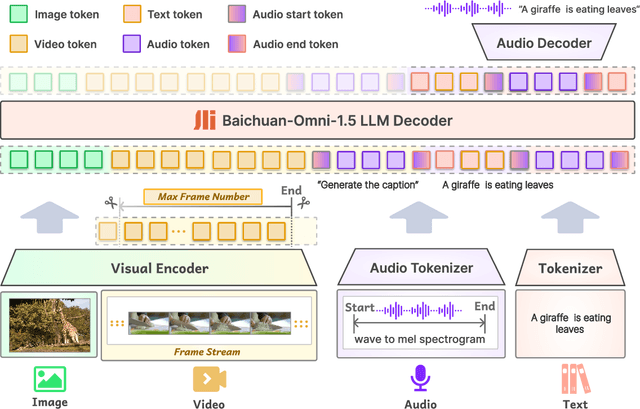
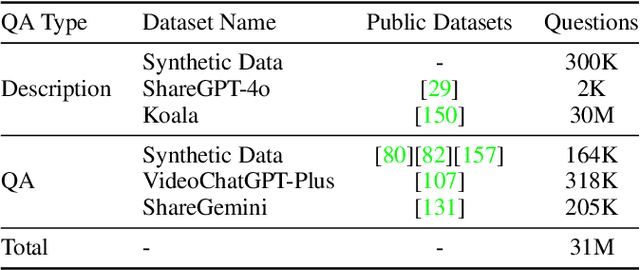
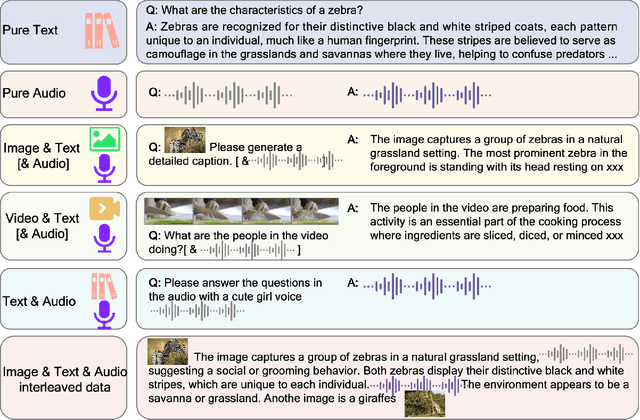
Abstract:We introduce Baichuan-Omni-1.5, an omni-modal model that not only has omni-modal understanding capabilities but also provides end-to-end audio generation capabilities. To achieve fluent and high-quality interaction across modalities without compromising the capabilities of any modality, we prioritized optimizing three key aspects. First, we establish a comprehensive data cleaning and synthesis pipeline for multimodal data, obtaining about 500B high-quality data (text, audio, and vision). Second, an audio-tokenizer (Baichuan-Audio-Tokenizer) has been designed to capture both semantic and acoustic information from audio, enabling seamless integration and enhanced compatibility with MLLM. Lastly, we designed a multi-stage training strategy that progressively integrates multimodal alignment and multitask fine-tuning, ensuring effective synergy across all modalities. Baichuan-Omni-1.5 leads contemporary models (including GPT4o-mini and MiniCPM-o 2.6) in terms of comprehensive omni-modal capabilities. Notably, it achieves results comparable to leading models such as Qwen2-VL-72B across various multimodal medical benchmarks.
Towards Precise Scaling Laws for Video Diffusion Transformers
Nov 25, 2024



Abstract:Achieving optimal performance of video diffusion transformers within given data and compute budget is crucial due to their high training costs. This necessitates precisely determining the optimal model size and training hyperparameters before large-scale training. While scaling laws are employed in language models to predict performance, their existence and accurate derivation in visual generation models remain underexplored. In this paper, we systematically analyze scaling laws for video diffusion transformers and confirm their presence. Moreover, we discover that, unlike language models, video diffusion models are more sensitive to learning rate and batch size, two hyperparameters often not precisely modeled. To address this, we propose a new scaling law that predicts optimal hyperparameters for any model size and compute budget. Under these optimal settings, we achieve comparable performance and reduce inference costs by 40.1% compared to conventional scaling methods, within a compute budget of 1e10 TFlops. Furthermore, we establish a more generalized and precise relationship among validation loss, any model size, and compute budget. This enables performance prediction for non-optimal model sizes, which may also be appealed under practical inference cost constraints, achieving a better trade-off.
Beyond Sight: Towards Cognitive Alignment in LVLM via Enriched Visual Knowledge
Nov 25, 2024
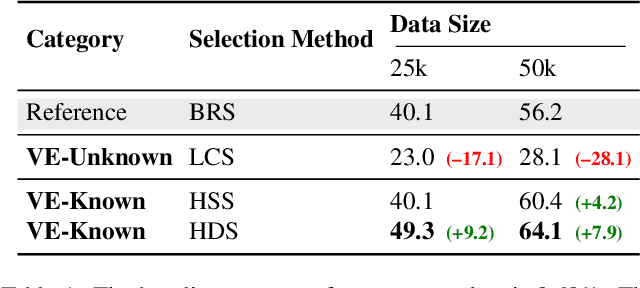
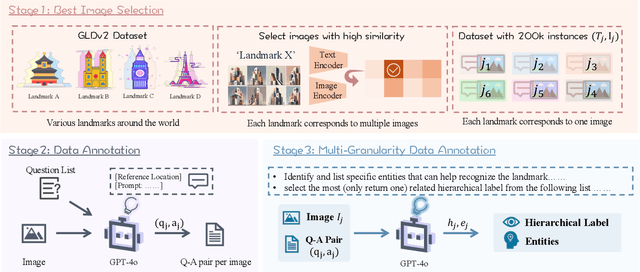

Abstract:Does seeing always mean knowing? Large Vision-Language Models (LVLMs) integrate separately pre-trained vision and language components, often using CLIP-ViT as vision backbone. However, these models frequently encounter a core issue of "cognitive misalignment" between the vision encoder (VE) and the large language model (LLM). Specifically, the VE's representation of visual information may not fully align with LLM's cognitive framework, leading to a mismatch where visual features exceed the language model's interpretive range. To address this, we investigate how variations in VE representations influence LVLM comprehension, especially when the LLM faces VE-Unknown data-images whose ambiguous visual representations challenge the VE's interpretive precision. Accordingly, we construct a multi-granularity landmark dataset and systematically examine the impact of VE-Known and VE-Unknown data on interpretive abilities. Our results show that VE-Unknown data limits LVLM's capacity for accurate understanding, while VE-Known data, rich in distinctive features, helps reduce cognitive misalignment. Building on these insights, we propose Entity-Enhanced Cognitive Alignment (EECA), a method that employs multi-granularity supervision to generate visually enriched, well-aligned tokens that not only integrate within the LLM's embedding space but also align with the LLM's cognitive framework. This alignment markedly enhances LVLM performance in landmark recognition. Our findings underscore the challenges posed by VE-Unknown data and highlight the essential role of cognitive alignment in advancing multimodal systems.
Baichuan-Omni Technical Report
Oct 11, 2024



Abstract:The salient multimodal capabilities and interactive experience of GPT-4o highlight its critical role in practical applications, yet it lacks a high-performing open-source counterpart. In this paper, we introduce Baichuan-Omni, the first open-source 7B Multimodal Large Language Model (MLLM) adept at concurrently processing and analyzing modalities of image, video, audio, and text, while delivering an advanced multimodal interactive experience and strong performance. We propose an effective multimodal training schema starting with 7B model and proceeding through two stages of multimodal alignment and multitask fine-tuning across audio, image, video, and text modal. This approach equips the language model with the ability to handle visual and audio data effectively. Demonstrating strong performance across various omni-modal and multimodal benchmarks, we aim for this contribution to serve as a competitive baseline for the open-source community in advancing multimodal understanding and real-time interaction.
SEA: Supervised Embedding Alignment for Token-Level Visual-Textual Integration in MLLMs
Aug 21, 2024Abstract:Multimodal Large Language Models (MLLMs) have recently demonstrated remarkable perceptual and reasoning abilities, typically comprising a Vision Encoder, an Adapter, and a Large Language Model (LLM). The adapter serves as the critical bridge between the visual and language components. However, training adapters with image-level supervision often results in significant misalignment, undermining the LLMs' capabilities and limiting the potential of Multimodal LLMs. To address this, we introduce Supervised Embedding Alignment (SEA), a token-level alignment method that leverages vision-language pre-trained models, such as CLIP, to align visual tokens with the LLM's embedding space through contrastive learning. This approach ensures a more coherent integration of visual and language representations, enhancing the performance and interpretability of multimodal LLMs while preserving their inherent capabilities. Extensive experiments show that SEA effectively improves MLLMs, particularly for smaller models, without adding extra data or inference computation. SEA also lays the groundwork for developing more general and adaptable solutions to enhance multimodal systems.
 Add to Chrome
Add to Chrome Add to Firefox
Add to Firefox Add to Edge
Add to Edge